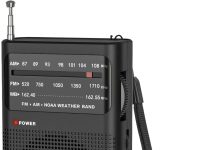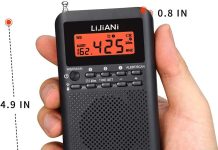In this article, we are going to explore a question that often arises when it comes to emergency weather radios – how long will those backup batteries actually last? We all know the importance of staying prepared for unexpected weather events, but it can be frustrating to not know how long our equipment will actually be able to function when we need it most. Well, fear not! We have done the research and have all the information you need to ensure your emergency weather radio is ready to keep you informed and safe for as long as you need it. So, let’s get right into it and find out just how long those backup batteries will last!
Review contents
Factors Affecting Backup Battery Life
When it comes to emergency weather radios, having a reliable backup battery is crucial. After all, these radios are designed to provide essential information during emergencies or power outages when regular communication channels may be disrupted. However, the lifespan of backup batteries can vary depending on several factors. In this article, we will explore the key factors that can affect the backup battery life of an emergency weather radio.
Radio Usage
The usage of the radio itself plays a significant role in determining how long the backup batteries will last. Here are a few factors related to radio usage that can affect battery life:
Transmitting vs. Receiving
One important factor to consider is the mode in which the radio is being used. If the radio is primarily being used to transmit messages, it will consume more power compared to when it is used solely for receiving. Transmitting requires a higher energy output from the radio, which can drain the battery at a faster rate.
Volume Level
Another factor affecting battery life is the volume level at which the radio is being used. Higher volume settings will require more power, ultimately reducing the overall lifespan of the battery. It is advisable to keep the volume level moderate to conserve battery power.
Frequency of Use
The frequency at which the radio is being used will also impact the battery life. If the radio is used for extended periods without breaks, the batteries will drain faster. On the other hand, using the radio intermittently will allow the batteries to last longer.
Use of Additional Features
Some emergency weather radios come with additional features such as flashlights, sirens, and phone charging capabilities. While these features can be handy in certain situations, they can also significantly drain the battery. It is important to use these features wisely, as excessive use can shorten the backup battery life.
Battery Capacity
The capacity of the battery itself is an essential factor to consider when determining how long the backup batteries will last. Here are a few aspects related to battery capacity that can affect lifespan:
mAh Rating
mAh (milliampere-hour) rating is a commonly used metric for measuring the capacity of a battery. Simply put, a higher mAh rating indicates a greater capacity and, therefore, a potentially longer battery life. When choosing an emergency weather radio, it is advisable to opt for one with a higher mAh rating to ensure longer backup battery life.
Actual Capacity
While the mAh rating gives an indication of the battery capacity, it is worth noting that the actual capacity can vary depending on various factors. For example, the actual capacity of a battery can be slightly lower due to internal resistance or inefficiencies in the charging and discharging processes. It is always a good idea to check the actual capacity of the battery provided by the manufacturer to have a more accurate estimation of the backup battery life.
Battery Life Estimation
Estimating the battery life based on capacity alone is not always straightforward. Several other factors, such as usage patterns and additional features, need to be considered. While manufacturers often provide an estimated battery life, it is essential to keep in mind that these numbers are rough estimates and can vary in real-world usage.
Battery Type
The type of battery used in an emergency weather radio can have a significant impact on the backup battery life. Here are a few battery types commonly used in these radios:
Alkaline Batteries
Alkaline batteries are a popular choice for emergency weather radios due to their widespread availability and affordability. They provide a decent amount of power and can last for a reasonable period. However, it is important to note that the backup battery life of alkaline batteries can vary depending on the factors mentioned earlier.
Lithium Batteries
Lithium batteries offer several advantages over alkaline batteries. They have a higher energy density, meaning they can store more power in a smaller package. This translates to a potentially longer backup battery life. Additionally, lithium batteries have a longer shelf life, making them suitable for emergency situations where the radio may not be used frequently.
Rechargeable Batteries
Some emergency weather radios are designed to work with rechargeable batteries. These batteries can be charged and reused multiple times, making them a cost-effective and sustainable choice. However, it is important to note that the backup battery life of rechargeable batteries can be shorter compared to non-rechargeable options. Regular recharging is necessary to maintain optimal performance.
Battery Age
The age of the battery itself is a crucial factor that can affect backup battery life. Here are a few considerations regarding battery age:
Fresh Batteries vs. Expired Batteries
Using fresh batteries is highly recommended for optimal backup battery life. Over time, batteries can lose their capacity and efficiency, resulting in reduced backup battery life. It is important to check the expiration date of the batteries and replace them before they expire to ensure reliable performance during emergencies.
Self-Discharge Rate
Batteries gradually lose their charge even when not in use. This phenomenon is known as self-discharge. The self-discharge rate varies depending on the type of battery and storage conditions. Batteries with higher self-discharge rates will have a reduced backup battery life compared to those with lower rates. Storing the batteries in a cool and dry place can help minimize self-discharge.
Effect of Storage Conditions
The way batteries are stored can have a significant impact on their overall performance. Extreme temperatures, moisture, and exposure to sunlight can accelerate the deterioration of the battery. It is important to store backup batteries in a cool and dry place, away from direct sunlight, to ensure optimal performance and maximum backup battery life.
Weather Conditions
The weather conditions in which the emergency weather radio is being used can also affect the backup battery life. Here are a few factors to consider:
Temperature
Extreme temperatures, both hot and cold, can significantly impact battery performance. Cold temperatures can cause a decrease in battery capacity, while hot temperatures can cause batteries to deteriorate more quickly. It is advisable to keep the radio and backup batteries at moderate temperatures to prolong the backup battery life.
Humidity
Excessive humidity can cause corrosion and damage to batteries, reducing their overall lifespan. It is important to protect the emergency weather radio and backup batteries from high humidity by storing them in a dry environment.
Extreme Conditions
In certain emergency situations, such as hurricanes or severe storms, the weather conditions can be extremely harsh. These conditions can put additional strain on the backup batteries, resulting in a shorter overall lifespan. While it may be challenging to control the weather, it is worth considering the potential impact of extreme conditions on backup battery life when preparing for emergencies.
Average Battery Life of Emergency Weather Radios
Determining the exact battery life of an emergency weather radio can be challenging due to various factors at play. While manufacturers often provide specifications regarding battery life, these numbers can be considered rough estimates. Factors such as usage patterns, power settings, and additional features can affect the actual battery life experienced by users.
Manufacturer Specifications
Most reputable manufacturers provide an estimated battery life for their emergency weather radios. These estimates are typically based on specific usage scenarios and can give an idea of what to expect in terms of backup battery life. It is important to note that these estimates may vary in real-world usage due to the factors mentioned earlier.
Real-World Usage
Real-world battery life can vary significantly depending on individual usage patterns and conditions. Some users may experience longer battery life if they use the radio sparingly or on lower power settings, while others may find that their batteries drain quickly due to more frequent use or higher power settings. It is advisable to keep track of battery usage and observe how long the backup batteries last in different usage scenarios to gain a better understanding of the individual radio’s battery life.
Tips to Maximize Backup Battery Life
While the backup battery life of an emergency weather radio can be influenced by various factors, there are several tips to maximize battery life. Here are a few strategies to consider:
Choose Low Power Settings
Using lower power settings on the radio can significantly extend the backup battery life. Most emergency weather radios offer different power settings to conserve battery power. Using the lowest effective power setting for the given situation can help prolong the battery life.
Turn Off Unnecessary Features
If the emergency weather radio has additional features such as flashlights or sirens, it is advisable to turn them off when not in use. These features can consume additional power, reducing the overall backup battery life. Only enable the features that are necessary for the specific situation.
Use External Power Sources
In addition to relying solely on backup batteries, it is recommended to have access to external power sources, such as AC adapters or portable power banks. Utilizing these alternative power sources can help conserve the backup batteries for critical situations when external power is not available.
Replace Batteries Regularly
Regularly checking the condition of the backup batteries and replacing them as needed is important for ensuring optimal performance. As mentioned earlier, expired or worn-out batteries can have reduced backup battery life. Keeping a fresh supply of backup batteries and periodically checking their expiration dates can help maintain reliable emergency communication.
Importance of Backup Battery Life
Understanding the factors that can affect backup battery life is crucial for several reasons. Here are a few key reasons why having a reliable backup battery life in an emergency weather radio is important:
Reliable Emergency Communication
During emergencies or power outages, having a backup battery with an extended lifespan ensures that the emergency weather radio can operate when it is needed the most. Reliable communication is vital for receiving critical updates and information in order to make informed decisions and stay safe.
Extended Power Outages
In situations where power outages extend for a longer duration, a backup battery with a longer lifespan becomes even more crucial. A robust backup battery provides peace of mind by ensuring continuous access to important news, weather alerts, and emergency information.
Portable Emergency Preparedness
Emergency weather radios are often designed to be portable and can be carried during outdoor activities or while traveling. Having a backup battery with a longer lifespan allows for extended use of the radio in remote or isolated areas where access to power sources may be limited. This enables individuals to stay connected and informed even in challenging environments.
Conclusion
In conclusion, several factors can affect the backup battery life of an emergency weather radio. Radio usage, battery capacity, battery type, battery age, and weather conditions all play a role in determining how long backup batteries will last. By understanding these factors and following the tips mentioned, individuals can maximize the backup battery life of their emergency weather radios. A reliable backup battery life ensures uninterrupted access to critical information during emergencies, power outages, and other challenging situations, ultimately contributing to personal safety and well-being.



























